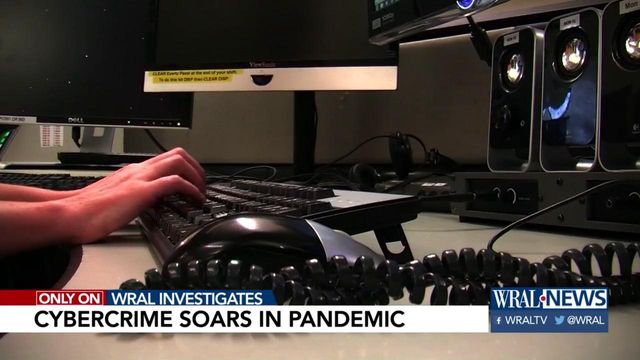Coronavirus leads to surge in computer hacks, compromising your data
While the pandemic shuttered businesses and forced millions of people to work from home, computer hackers from around the world saw an opportunity. In 2020, there were more than 1,600 computer breaches reported to the state Attorney General's Office that impacted North Carolinians.
Posted — UpdatedWhile the pandemic shuttered businesses and forced millions of people to work from home, computer hackers from around the world saw an opportunity. In 2020, there were more than 1,600 computer breaches reported to the state Attorney General’s Office that impacted North Carolinians.
An alarming number of those breaches involved ransomware, where hackers essentially hijack computer networks and demand a payment to return the data. In 2019, 35 ransomware attacks were reported in the state. Last year, that number soared to 356. Experts say the coronavirus is partly to blame for skyrocketing number of cyber attacks.
"Cyber criminals have now formed organizations using the internet to create more damage and perform more crime than drug crime worldwide," Gary Miliefsky told WRAL Investigates. He’s the CEO of Cyber Defense Media Group and is known around the world as a leading cyber security expert.
Criminals don’t target just big companies with deep pockets. They also targeted non-profits, educational systems and local government. Just last year, Durham, Rocky Mount and Chatham County dealt with attacks. Even more disturbing, 2020 saw an increase in attacks on hospitals and nursing homes, where the decision to pay or not to pay can literally be a life or death choice.
Miliefsky says the way that daily life has changed during the pandemic actually helped hackers.
"When you’re working from home in this digital transformation our home computers are very, very insecure," he said.
Before the pandemic about 3% of people worked from home. That number’s now closer to 40%. And to criminals, that’s more opportunity, says Miliefsky. "We’re all using home computers that may not have good hygiene, so cyber criminals do know this."
The explosion in smart devices also opens avenues for criminals. Miliefsky says that’s even more true in the medical field. He feels technology can help and hurt at the same time. "When we take healthcare and other critical infrastructure and bring in these new devices that are supposed to make life easy for staff and doctors, and it’s all remotely controllable on your smart phones, you’ve also opened the door for malware, ransomware and cyber criminals."
"What we’re seeing is just a dramatic surge in ransomware events," explains North Carolina Attorney General Josh Stein. His office collects information on every computer breach where someone in the state is among the victims. Last year, 257,000 North Carolinians were impacted by ransomware attacks, making them more vulnerable to identify theft.
"You do not want this to happen to you," Stein said about the hassle of dealing with a breach. And he knows from experience. Stein was among the victims when hackers accessed information from an accountant’s office.
Both Stein and Miliefsky stress the importance of constantly backing up data, keeping anti-viral software up to date and most importantly, being aware of unknown email attachments.
"Do not click on any attachment unless you are certain who the sender is," says Stein. Miliefsky says that can be tough, because the criminals are tricky. "The average employee doesn’t want malicious attacks on their network, but they will click a link that says they won the lottery and that will cause a ransomware exploit."
The high-tech, highway robbery will only continue to get worse, even once the pandemic is over, says Miliefsky. "Big companies, government agencies, there have been so many payouts, that’s why cybercrime is into the trillions."
• Credits
Copyright 2024 by Capitol Broadcasting Company. All rights reserved. This material may not be published, broadcast, rewritten or redistributed.






